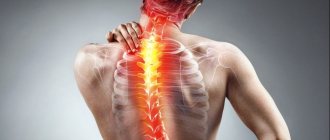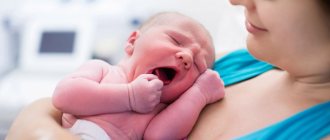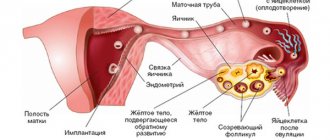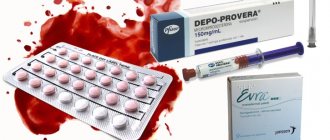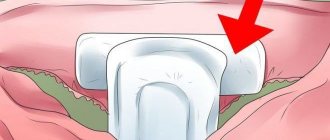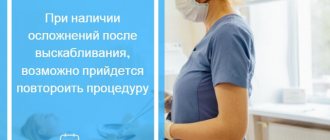Menstruation is a physiological phenomenon in the body. Their frequency, pain, volume and some other parameters can tell a lot about a woman’s health. Often after childbirth, periods change their character, which sometimes seriously worries a young mother, especially if she did not have any problems before.
The situation largely depends on how the pregnancy proceeded and what manipulations were performed during the birth of the baby. When can you expect painful periods after childbirth, what should you do and when should you urgently go to the doctor?
Period of restoration of menstruation
Menstruation is the discharge of blood from the vagina that occurs every month. The cause of this condition is the disintegration of the mucous layer in the uterus, since there is no fertilization. Menstruation continues until the endometrium is completely rejected. In pregnant women, menstruation is suspended and restored after the birth of the child individually in each specific case.
The time it takes for your period to return depends on several factors. Initially, menstruation is a hormone-dependent process that is caused by breastfeeding or its absence, the process of childbirth and medications administered during this period.
Regulations during lactation
The changes that occur in the body during pregnancy are normalized 1-2 months after birth. But it will take a young mother some time to stabilize her hormonal levels and eliminate postpartum stress.
During breastfeeding, periods do not return immediately
Restoring menstruation in each specific case is carried out personally. As a rule, if lactation occurs, menstruation appears from 2 months to 2 years after birth. When a woman breastfeeds her baby only, the restoration of menstruation is possible at a later date or at the end of the lactation period.
Under the influence of certain factors, even with breastfeeding, changes can begin as early as a month after the birth of the child.
Resumption of menstruation when baby is fed formula
If a child eats a mixed diet, menstruation returns much faster. When the baby is fed only formula milk, menstruation begins already by the third month after birth. There is a gradual decrease in prolactin levels, due to which the normal menstrual cycle is restored.
With artificial feeding, the cycle is restored much faster
What should menstruation be like for a woman in labor?
The mother's monthly discharge resumes due to certain reasons, and the nature of the regulation is determined by the condition of the reproductive organs. At first, periods are often irregular because the body has not fully recovered. The duration of the cycle after childbirth changes all the time, the amount of discharge increases, in addition, a nagging pain occurs in the lower abdomen.
The very first period is often characterized by heavy discharge. This is normal if their duration is no more than 14 days. If the regulation is accompanied by dizziness, gagging, or loss of strength, it means that the functions of the mother’s reproductive organs are impaired.
If the menstrual cycle is unstable for 2-3 months, you need to use the services of a gynecologist. Because any disorder is fraught with serious consequences.
If a woman is healthy, stabilization of the cycle is observed in a short time. Otherwise, painful sensations indicate a problem.
Often a young mother notices a change in the nature of the discharge after childbirth. Regulations become less painful and less long lasting. This is due to the changed hormonal levels in a woman after the birth of a child, and the alignment of the curvature of the uterus.
If you are concerned about heavy and painful periods, it is recommended to consult a doctor
If it's pregnancy
If you have a pulling sensation in the abdominal area, do not forget about the possible pregnancy. Does the stomach hurt before menstruation during pregnancy worries many expectant mothers. The first week, when the egg is implanted into the uterus, a woman may feel unpleasant colic.
Normally, this condition will last about five days and then should stop. A woman expects her period to come, but it doesn’t come. It happens that the first week of pregnancy is marked by some discharge, similar to the beginning of menstruation, but it is more scanty.
Should we panic? If the blood is scarlet and contractions are observed, then immediate help is required. Early deadlines are dangerous due to the threat of interruption.
Prevention of pain before menstruation
To eliminate the problem of pain before the onset of natural bleeding, you must regularly visit a gynecologist. Various infections, inflammatory processes, adhesions and other problems lead to unpleasant symptoms. Therefore, having eliminated the causes of pain, you can forget about their manifestation later. And when they are not there, then life takes on bright colors.
Source
https://youtu.be/9pPGCkxzgKg
Factors affecting the occurrence of pain during menstruation
It should be remembered that the first 2-3 months after childbirth, the regulations are not constant, and are normalized only after this period. After the birth of a child, various changes are observed in the body, which are also noticeable in the functions of the reproductive organs.
The causes of pain during menstruation are as follows:
- disrupted hormonal levels;
- birth injury;
- use of cesarean section during childbirth;
- inflammation;
- oncological pathology;
- incomplete removal of pieces of the placenta from the body of the uterus after the birth of the child.
Any of these conditions can cause pain during menstruation. When you notice a deterioration in your health due to regulation, and you cannot cope with this condition, you should definitely seek help from a gynecologist.
Tumors in the uterus or ovaries can cause pain
The nature of pain and accompanying symptoms depending on the causes of its occurrence
Nagging pains, more like contractions, appear:
- with natural contraction of the uterus;
- after aspiration of the organ (to remove particles remaining after childbirth);
- when leaving biomaterial in the uterine cavity.
- increase in body temperature, incl. to very high values;
- symptoms of body intoxication (weakness, drowsiness, chills, vomiting);
- brown discharge mixed with pus;
- purulent smell of discharge.
Peritonitis as a complication of endometritis is manifested by severe abdominal pain and an increase in body temperature to critical levels (over 39-40°C). If the lower abdomen constantly hurts, especially on the side, you can suspect inflammation of other parts of the genitourinary system.
If the gastrointestinal tract is disrupted, a woman will feel spastic pain not only in the lower abdomen, but also in other parts. Diarrhea, nausea, heartburn, constipation or flatulence may occur.
How to relieve pain
When pain cannot be avoided, it is possible to ease it during menstruation.
Hygiene features
Intimate hygiene after the birth of a child changes slightly. During menstruation, tampons should not be used, as this interferes with the free flow of blood. The use of conventional pads can cause irritation of the mucous membrane, especially if there are seams.
It is recommended to use pads that have a smooth surface and are free of fragrances. Moreover, they should be changed every 4 hours. You should not use special intimate gels. It is better to wash with baby soap. You can have sex approximately 1.5-2 months after birth, since during this period there is a high risk of infection of the uterus.
It is very important to choose the right gaskets
Use of medications
Sometimes the pain during menstruation is so unbearable that a woman becomes unable to work. In this case, it is recommended to use medications for painful periods. But first, the cause of the pain must be accurately determined. Treatment methods used to relieve pain are listed in the table.
| Therapeutic method | What is it used for? |
| Taking analgesics | Used to relieve pain of any severity. |
| Taking non-steroidal anti-inflammatory drugs | |
| Taking antispasmodics | |
| Antibacterial drugs | Prescribed for any inflammation |
| Hormonal agents | Prescribed to relieve pain caused by endometriosis and other pathologies |
| Application of hysteroresectoscopy | Prescribed to eliminate synechiae in the uterus and cervical canal, remove stenosis |
| Use of laparoscopy | Used for resection of cysts, fibroids, endometriosis, removal of adhesions |
| Classic surgery | Performed in the presence of oncology, large cysts, fibroids, etc. |
Why did periods become painful after childbirth?
The restoration of reproductive functions during certain periods of a woman’s life does not always occur in accordance with the norm, and algomenorrhea, or painful periods after childbirth, is frequent evidence of this. The formation of the cycle after childbirth is an important hormonal process, and its timeliness confirms the healthy state of reproductive functions. Typically, the menstrual cycle begins to function immediately after the end of the breastfeeding period. But sometimes such a recovery darkens not only the joy of the birth of a baby, but also makes the condition itself painful upon the onset of critical days, during which menstruation becomes painful.
It must be remembered that during the first two or three months after the birth of the baby, periods come irregularly and become cyclical only after this period. After childbirth, various changes occur in the body, which can be felt in the reproductive system, which does not always correspond to the norm.
Pain during menstruation after childbirth can be caused by the following reasons, namely:
- hormonal imbalances;
- injury during labor;
- performing an operation using cesarean section;
- inflammatory processes;
- oncological diseases;
- insufficient release of the uterus after childbirth from placental particles.
Each of these conditions, resulting from childbirth or inflammatory processes, can provoke painful periods. If a woman feels unwell during menstruation, and this condition does not end, then it is necessary not to postpone a visit to the doctor.
The normal course of pregnancy and a successful birth bring a woman only positive changes occurring in the body. The enlarged uterus after childbirth takes on its natural position and original shape, due to which the pain during menstruation becomes weaker and soon subsides. But in some cases, deviations from the normal state are possible, when menstruation does not come at the scheduled time or comes, but with some deviations from the norm.
Such changes make it possible to suspect hormonal imbalances and eliminate
which can be done with the help of a specialist. A common occurrence in the postpartum period is heavy periods, which are accompanied by pain. When controlling this condition, you first need to pay attention to the duration of menstruation and the volume of blood lost, as well as its color and existing impurities. If mucus, fragments of foreign tissue or a yellowish-green color can be detected, this is a symptom of inflammation or a purulent infectious process. This condition requires emergency medical attention.
Painful periods after childbirth can be considered a natural process during which a woman experiences pain from contraction of the muscles of the uterus. During the postpartum period, the uterus returns to its physiological state, during which some painful cramping may occur.
The cause of pain during menstruation may be as a result of damage to the walls of the uterus during childbirth. As the injured areas heal, pain symptoms will begin to decrease.
Breastfeeding and simultaneously undergoing menstruation causes a double burden on the female body. Each of these processes is unique in its own way and requires effort and energy. Combining together, they are able to have a contradictory effect on the body, as a result of which some disorders are possible, accompanied by pain.
The first time after childbirth at the beginning of lactation, menstruation may come irregularly, but after a couple of months the cycle normalizes and everything returns to normal. The nature of menstruation at this time may differ significantly from how it was before pregnancy - it is more abundant or vice versa. The uterus is cleansed of everything unnecessary, spasms,
the accompanying changes pass and the pain during menstruation subsides, even if the woman suffered from painful menstruation before pregnancy.
In the case of the development of algomenorrhea during breastfeeding, the activity of contractions in the uterus is stimulated, intended to cleanse it of the rejected endometrial layer. In response to the contractile movements of the uterus, the nerve endings located in the abdominal cavity are also irritated, which leads to pain in the lower abdomen.
The presence of severe pain during menstruation, which becomes even more intense when the baby is put to the breast, can cause alarm and be a good reason to consult a doctor. It is also necessary to undergo an examination if, during lactation, severe pain, heavy discharge, or an irregular cycle lasts longer than six months. Such manifestations may be signs of inflammation developing in the ovaries or uterus, as well as symptoms of fibroids or endometriosis.
A mild degree of algomenorrhea is accompanied by minor pain during menstruation and does not affect activity and performance. It can be tolerated without using painkillers, but even such minor symptoms should not be ignored. This condition can eventually develop into a more severe form, which can be tolerated
it will be difficult. The average form of this pathological disorder, in addition to abdominal pain, is complemented by nausea, chills and a feeling of general weakness.
Severe cases require medication, as they disrupt the psycho-emotional state and cause depressive moods. Therefore, in case of painful periods, in any case, you cannot resort only to self-medication with painkillers; it is necessary to find out the cause of the pain. It is fashionable to entrust only specialists to use methods that allow you to normalize the delicate mechanism of the reproductive system.
There are several ways to significantly alleviate a woman’s condition by relieving her of painful periods. Many of them can eliminate pain symptoms or at least reduce their intensity. In case of a mild initial stage of development of the disease, gynecologists recommend creating more favorable working conditions and ensuring
sufficient rest with good sleep. If possible, it is better to give up bad habits. Provide adequate nutrition with sufficient vitamins and nutrients. Before your period begins, you should avoid sexual intercourse.
The appearance of pain during algomenorrhea occurs due to swelling of the tissues and associated with this process. Therefore, as a treatment in conjunction with pain therapy, it is necessary to prevent the appearance of tissue swelling before the onset of menstruation. To eliminate severe pain attacks, antispasmodics and analgesics are used. For more successful treatment, it is necessary to identify the cause of painful menstruation and direct treatment towards the underlying disease.
A woman experiencing pain during menstruation should visit a doctor for consultation in the following cases:
- if the pain lasts longer than usual;
- a sharp increase in painful symptoms that does not subside for several hours;
- increase in the number of discharges;
- in addition to the pain characteristic of menstruation, pain appears in the urinary tract;
- pain radiates to the leg and dizziness;
- symptoms appear with sharp pain, burning, previously unusual discharge with a pungent odor, etc.
There are quite effective ways to relieve a woman of pain during menstruation. Many of them are affordable and easy to use. It is necessary to use them in any case, since both the pain itself and its anticipation have an adverse effect on the woman’s general well-being.
source
Menstruation is an integral part of a woman's life. They can be painful, cause a lot of inconvenience, or they can pass almost unnoticed and not bother you at all with their presence, but in any case they should be regular and come every month.
The first periods appear at 12–16 years of age. By the age of 18, they should already be stable, and the woman should have a clear idea of what her cycle is, what the features of menstruation are, etc.
The only period when menstruation can and should not occur is pregnancy and lactation. But if everything is clear with pregnancy, then with the postpartum period not everything is so simple and therefore women have a lot of questions. Let's look at them.
Immediately after childbirth, the mother's uterus begins to contract, which leads to the release of blood clots from it. The first day they are more abundant, and then the amount of discharge should decrease. By the way, discharge after childbirth is called lochia, not menstruation.
Ideally, lochia disappears completely four weeks after birth, but it happens that they continue to appear up to 8 weeks.
If a woman changes one pad per hour, then this is already a reason to sound the alarm, since we are talking about bleeding. If the number of lochia does not decrease over time, they have a bright red tint - this is also a cause for concern. Pain in the lower abdomen, too much brown discharge with an unpleasant odor indicate that not all is well in the uterus, perhaps there is some kind of inflammatory process, an infection has occurred, or there are still pieces of the placenta remaining and cleaning is required.
https://youtu.be/Vez-Qf3t-SM
There is no clear answer to this question. It all depends on how quickly the hormonal levels are restored and the individual characteristics of the woman’s body. With the onset of pregnancy, the expectant mother’s body produces a hormone that blocks the functioning of the ovaries. Further, breastfeeding also produces the hormone prolactin, which also prevents the ovaries from working at full capacity. Ideally, menstruation should be absent for as long as a woman is breastfeeding, but in practice, everything is different for everyone. The production of prolactin is also affected by the frequency of breastfeeding and the amount of milk produced. Therefore, if a woman begins to introduce complementary foods or combine breastfeeding with artificial feeding, this may immediately lead to the onset of menstruation.
If a woman does not breastfeed her baby at all, then her periods begin much earlier, approximately 3-4 months after birth.
No, it doesn't. The body does not care whether a woman gave birth naturally or through a cesarean section. As mentioned above, it's all about hormonal levels.
Stress and bad habits (smoking, drinking alcohol, etc.) have a very negative effect on the functioning of the body, which can lead to a very early restoration of menstruation. Accordingly, the quantity and quality of milk produced will decrease, which will affect breastfeeding in general.
Certain medications, complications after childbirth, the diet and lifestyle of the new mother can also affect the arrival of menstruation.
For the first four weeks after giving birth, it is better to avoid intimate relationships altogether. Firstly, the woman has not yet stopped secreting lochia. Secondly, she may have a lot of pain from stitches and muscle strains. contractions of the uterus, etc. And thirdly, during this period it is very easy to introduce some kind of infection into the vagina, since the body is very vulnerable.
If, several months after childbirth, the pain from sexual intercourse does not go away, penetration causes discomfort, then you should consult a doctor. Perhaps the reason is cervical erosion or some kind of inflammatory process.
As a rule, the first periods after a long break are very heavy. This should not be scary or alarming. This is simply how the entire reproductive system is “launched.”
You should also not expect that your periods will immediately begin to arrive on time, as before. Some instability - small delays or, conversely, their premature appearance may be present. But within a few months everything should definitely get better, the monthly cycle should stabilize and be regular.
Pain during menstruation in most cases is caused by a bending of the uterus. Childbirth helps the uterus straighten and therefore pain disappears. It happens that this condition can be fixed forever, but it happens that gradually everything returns to normal again. A new pregnancy and childbirth can again help a woman regain painless menstruation and comfort.
We remind you that we are talking about the absence of menstruation after childbirth and during breastfeeding. And the answer here is clear and unconditional: yes, you can get pregnant while taking a break from your period. Despite the absence of discharge, ovulation occurs. Therefore, you need to protect yourself as competently and fully as possible, not to use interrupted sexual intercourse as contraception, and certainly not to calculate “safe” days, which in principle do not exist.
- If a year after giving birth or a couple of months after finishing breastfeeding, your periods have not returned, then this is a cause for concern.
- You should also be wary of excessively long discharge of lochia - more than 8 weeks. We wrote above what the color and smell of lochia should be.
- Too heavy periods after childbirth is a reason to visit a gynecologist.
Two months after giving birth, every new mother must undergo a full examination by a gynecologist, undergo all smears and tests to rule out blood stagnation in the uterus, an inflammatory process, the presence of an infection or an unhealed suture, cervical erosion, etc.
Did you like the article? Save:
What is it for? This is necessary in order to quickly place a link to interesting material on a website (HTML code) or forum (BB code).
—>
|

